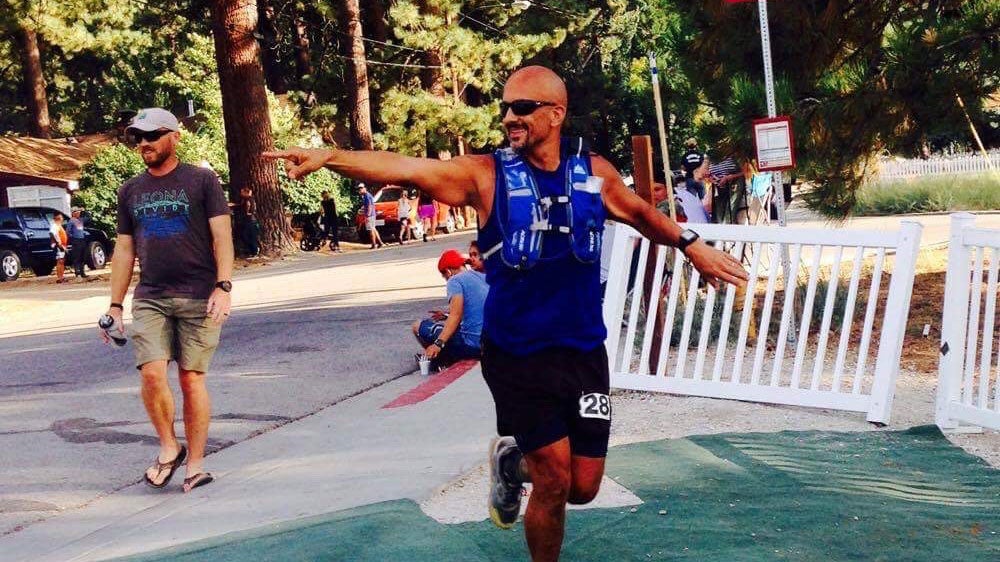#Trispo: From Addict to Avid Triathlete

The clock was ticking at the 2015 Oregon Double Anvil triathlon, and with 10 minutes before the final cutoff, Tim Davis was nowhere to be seen. Of the 16 athletes who signed up for the double-iron distance triathlon, only 10 actually showed up to the starting line. Two had dropped out during the race, and seven had already finished. Davis was the only wild card. The spectators peered into the darkness, wondering if the final finisher would really finish.
Davis knew he was perilously close to the cutoff. He also knew he was completely spent after a 4.8-mile swim, 224-mile bike, and 52.4-mile run. But most importantly, he knew he had come too far to quit. This race was more than an ultimate physical challenge for Davis; it was the culmination of the hard-fought battle to reclaim his life.
Davis’s triathlon journey began in the most unlikely of places: a drug rehab center, where he was trying to kick an addiction to drugs and alcohol. The first two weeks of detox were hell: major insomnia, anxiety, racing thoughts, and suicidal ideation left Davis wondering if he could really stay clean.
“It was challenging to pinpoint what was really going on,” recalled Davis. “I had been using methamphetamine for a few months. I was self-medicating with drugs and alcohol, and somehow trying to be a decent husband and father—but not doing as good as I should have been.”
As Davis tried to get a grasp on sobriety, more distressing symptoms developed: panic attacks, depression, and impulsive behaviors. His symptoms fit the bill for bipolar disorder, yet Davis was reluctant to accept the psychiatrist’s diagnosis at first. He tried and failed, again and again, to prove he was fine, that he could handle things on his own. But a continuing cycle of relapse and rehab eventually forced Davis to confront the truth.
“I realized that I could die from my disease and disorder if I didn’t earnestly seek help,” said Davis, who can recall the exact date he finally admitted he needed help: June 15, 2007. He agreed to comply with a treatment program, which included a medication regimen, participation in 12-step meetings and daily exercise.
The first two parts–take the medicine and go to 12-step meetings–was the bedrock of recovery. The third saved his life. The all-in nature of a triathlon appealed to Davis, so he began training and racing in earnest–at first, with no wetsuit, an old mountain bike, and baggy basketball shorts. With every day of training and every finish line crossed, he felt stronger and healthier. Indeed, he was all-in on triathlon.
“I found training for and racing in triathlons to be a new, positive addiction, if you will,” explained Davis. “It became the outlet I needed to tame or channel both my hypomanic/bipolar manic symptoms and my addictive personality.”
Davis has racked up an impressive race resume in recent years: 14 iron-distance triathlons, seven 100-mile ultramarathons, cycling more than 300 miles at the 24 Hour World Cycling Championships. And, of course, there’s his finish at the 2015 Oregon Double Anvil triathlon, where Davis says he dug deep to “just barely finish” with only seven minutes to spare before the 39-hour cutoff.
“This was the only race I ever finished DFL, or Dead Fricking Last,” said Davis. “I never knew how happy I would be to be last. It was such an amazing accomplishment just to finish it, period.”
He is also proud to say he is approaching 13 years of sobriety and 11 years of being completely med-compliant. Since getting sober, Davis has added a third child to his family, earned a master’s degree in education, and chronicled his journey in a book, Tripolar: The story of a bipolar triathlete. He also speaks at rehab and mental health facilities, sharing his story and serving as a testament to the power of exercise for physical and mental health.
“Training for and racing in triathlons is an essential part of my recovery. I don’t believe I could lead a normal, functional life without my regular triathlon training and running,” says Davis. “I still go to 12-step meetings once a week, but I train and work out almost every day. I just start getting too crazy if I don’t get my regular dose of exercise endorphins. My wife can tell when I am getting restless or hypomanic, and she tells me to get lost and go run, bike, or swim. Triathlon is my medication and meditation.”